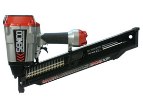
Nail Gun Sellers Rarely Offer Safety Tips
Researchers from Duke University Medical Center found sales personnel in most stores offered some misinformation, and 59 percent gave no suggestions for safe use.
Duke University Medical Center researchers decided to test how much safety information is offered by the people selling nail guns to builders, contractors, or homeowners, and they did not like what they found.
Visiting 217 home improvement big-box stores and stores that sell directly to builders or contractors, such as lumberyards, in North Carolina, West Virginia, southwestern Pennsylvania, Missouri, southern Illinois, and Texas, the researchers posed as new users interested in purchasing the tools for a home project, such as framing a deck or fence. Sales personnel were given a chance to volunteer safety information about the tools, and if they did not, the researchers asked a general question about the safety of the tools. If the salespeople still did not offer accurate safety information, the researchers asked specific questions about nail guns, the risks involved with using them, and the different trigger types available.
In a news release dated April 14, the team said they received some source of misinformation at almost 75 percent of the businesses they visited, and 59 percent of the salespeople they met gave no suggestions for safe use. "It's alarming that a consumer, whether it's a contractor buying for their working population or a home user buying for their own use, doesn't get better information -– particularly given the devastating nature of some of these injuries and the risk of 'stand-by' exposures to other workers or family members," said Hester Lipscomb, Ph.D., professor in the Division of Occupational and Environmental Medicine at Duke University and lead author of the study.
Salespeople in stores selling primarily to contractors were more likely to offer safety information, but only half of them did. Researchers were often told the tools were safe to use, even when that salesperson related a story about someone who had been injured.
"We were all surprised at being reassured that the tools were safe while also being told about people who had been injured," Lipscomb said. "We were also surprised by the attitude of being very much accepting of injury."
The release says more than 35,000 injuries from nail guns are treated in U.S. emergency departments every year, and about 14,000 of these injuries are among consumers. Lipscomb leads a team doing research that is focused on raising awareness of the sequential trigger, which cuts the risk of acute injury in half when used instead of the more common contact trip trigger. "Since there is not a requirement for the safer trigger, the point of sale becomes a very vital source of information about the tools and their triggers," she explained.
They believe sales personnel don't have access to the information they need and are not aware of a 2003 voluntary industry standard that called for nail guns to be shipped with the sequential trigger.
"Unfortunately, neither the Consumer Product Safety Commission nor the Occupational Safety and Health Administration have requirements that address the acute injury risk associated with use of these tools," Lipscomb said, adding that they could join forces to require an existing engineering solution that would protect both workers and consumers doing do-it-yourself projects.
The research, which is published online in the American Journal of Industrial Medicine, was funded by CPWR – The Center for Construction and Research Training. Co-authors of the study include James Nolan and Dennis Patterson of the Carpenters District Council of Greater St. Louis; Mark Fullen and Brandon Takacs of West Virginia University; and Lisa A. Pompeii of The University of Texas School of Public Health.